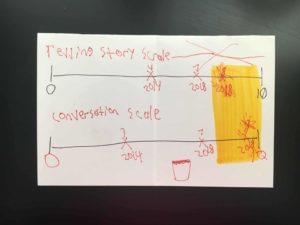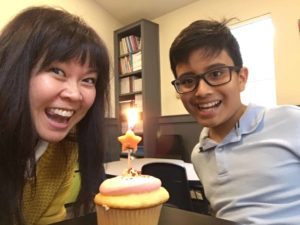I just got off the phone with John, a student from the University of Virginia taking an introductory course in Communicative Disorders. He asked questions about being a speech-language pathologist, and I answered them. His final question addressed the one lesson that has made the most impact on my career as a speech-language pathologist. I would like to share this lesson through a story about my Nicholas.
The Human I Support
I have been seeing Nicholas since 2014. He is a 10-year-old who loves the Grossery Gang and telling creative/odd/humorous stories about sneaky characters. I’ve been seeing him individually and in a social skills group 1-2 times a week to work on expressive language and social-pragmatic skills. Yesterday afternoon, I was going to share that it was time for Nicholas to graduate from speech-language therapy. He came into my room and said, “I’m feeling silly today! My teacher walked out of my class, and the kids were CRAZY!” When he asked about me, I lied. “I’m feeling pretty good today. I had a really nice Thanksgiving.”
In all honesty, my feelings about graduation are typically mixed. I’m a proud SLP, and I love being a speech-language pathologist. I am also going to miss this human being that I have witnessed growing and changing for the last four rotations around the sun.
When Speech-Language Therapy Ends
Nicholas learns best with visuals. So, I pulled out a piece of paper, and I asked him what we work on in speech. We always start the session by reviewing his goals. So, this was a typical intro to our session. I asked him to draw a “0-10” scale for his two goals: telling a story and having a conversation. “Nicholas, I want you to give yourself a score for ‘telling a story’ and ‘having a conversation for 2018 and for the first time you saw me in speech.” He quickly did the math and said he was 6-years-old, in the first grade and the year was 2014 for our initial session.

Evidence A.
The self-ratings? In the arena of narrative skills, he gave himself a “4” in 2014 and an “8” for 2018. Regarding his conversational abilities, he gave himself a “3” in 2014 and a “9” for his current day performance. He recognized his own growth, and my data aligns perfectly to his personal assessment. I then took out a yellow marker and highlighted ratings 8-10. “Nicholas, do you know what it means when you are able to tell a story and have a conversation on this [yellow] part of the scale?” He scooted back in his chair and flatly said, “What?” I told him it was time to graduated, and he responded with an affirmative, “No.” I present Evidence A.
I acknowledged his efforts, expressed my pride for his earned skills and showed a plan for the remaining sessions (and a final celebratory session!) My keen skills being a speech-language pathologist observed from his non-verbal language that he was not invested in my words.
Self-Advocacy
Then, he proceeded to use the skills we have been working and working and working on for the last four years to self-advocate. Here was his organized, powerful response:
- “Theo* is in the 6th grade, and he still gets to come see you. I’m just in the 5th grade.”
- “You need to teach me harder things. I need to learn harder things.”
- “I was wrong! I’m only a “7” in “telling a story” and “having a conversation!” He then proceeded to cross out his initial answer on the rating scales. “See?! We have more work to do.”
- “You did not convince me.”
Oh, how my heart swelled and ached. Here’s to being a speech-language pathologist.
*Name has been changed.
SLP Me
You see, the story of Nicholas speaks to the relationship we have with the humans we serve. Nicholas no longer requires my support as a speech-language pathologist. It’s not about “telling a story” and “having a conversation” anymore. His continued needs speak to the relationship we have built and the meaningful connections we have made. So, I responded to John’s final question:
“John, when I graduated from UW-Madison, I knew a lot of things. I studied hard, and I used that knowledge. Over time, I realized that the relationship and rapport and connection made a difference. My knowledge about speech-language pathology was only part of my work. Now, a decade and a half later, I invest in the people. I care deeply for them and, from that, we tackle the communication goals–together.”
Story of (Changed) Us

Evidence B.
You see, dear SLPs, we get into this profession to exist alongside individuals needing communication support. It’s an honor to serve in that capacity, and our work is important. From my small world, though, the gains are not just for our students and clients. We change. As the SLP, I am forever changed after each valuable human being I serve. We gain so much from (valuable, relevant, important) them. I present Evidence B.




Fabulous! the best to both of you!!!!
Thank you, Raquel. Our job is to help others on their communication journey. I just never realized how much we gain, in head and heart, as SLPs. Take care, Phuong.
Ah, beautiful. Great story to end the school year with. Keep doing what you do, Phuong!
Thank you, Saira. I’m hopeful your break was restful and festive. Here’s to more good, good work in 2019.
Exactly! I have been an elementary school SLP for 23 years. I can’t tell you what goals we worked on, but I can tell you about the kids who will stay in my heart forever!
Marian, forever and ever! A few years ago, I was asked to attend a fifth grade graduation. One of my former students, then a senior in high school, was going to do the keynote. We used to work on social-pragmatic skills, and I thought of her often through the years. There she was behind the podium. She spoke of her experiences at her former elementary and the skills she learn in speech(!), and there I was in the back crowd–ugly crying. Oh, they make such an imprint on our hearts. Thank you for your 23 years, Marian.
This is so so true. I gain so much in my heart and spirit with each student I connect with, and we are both left better for it. This is at least half of what it means to be an SLP to me. 🙂
Virgina, yes! AT LEAST half of what it means to be an SLP. I whole-heartedly agree. Aren’t we lucky?
Thank you for this beautiful article Phuong!
Gabriela, thank you. Here’s to more good work in 2019.
Beautiful!
Thanks, Katy.
Phuong you are so inspirational! When I need to be motivated, I can always look to your blogs or books for it! Thank you for reminding myself and all SLPs how important our role is in the lives of others.
Thank you, Caroline! Our job is important. Thank you for contributing to this meaningful, whole-hearted work. Also, our job is fun and funny. Just this morning, I pulled a first grader to test for articulation. The other SLP was using the speech room. So, I was working from a storage room next to the library. When I told the student that you can find things in the room from the 1980’s, she said, “The 80’s?! You mean, when there was no color in the world?!” Our job has so much to offer. 🙂
Phuong, I’m sure you hear it all the time, but when I grow up, I want to be just like you!!! You are amazing! Your stories are phenomenal! Your heart is non-stop motivation!
Ann! Your words are kind, and I appreciate them so much. On all days, I deeply love our profession. I will also say that, on most days, my SLPing and mothering duties are fulfilling…and exhausting. Thank you for reminding me of my “why.” Here’s to our meaningful work.